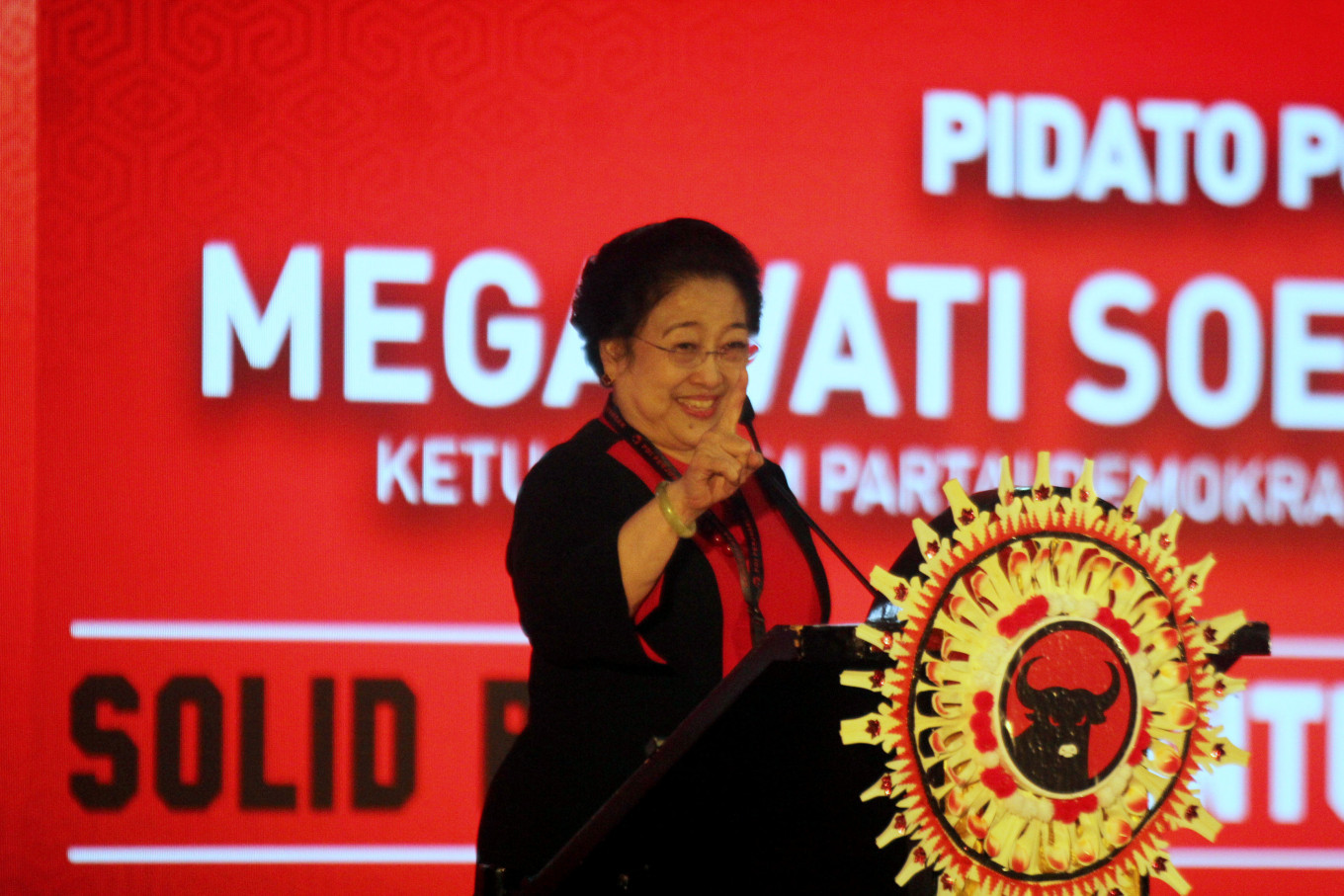History to blame for PDI-P woes in W. Sumatra
In a normal setting, the speech from senior PDI-P politician Puan Maharani could be considered tame, if not normative. "We hope that West Sumatra can indeed be a province that will support a Pancasila state," Puan said in his closing remark in a virtual meeting to announce the ticket of Mulyadi and Ali Mukhni to run in this year's gubernatorial election.
Change text size
Gift Premium Articles
to Anyone

T
he Indonesian Democratic Party of Struggle (PDI-P) is so unpopular in West Sumatra that even an effort to reach out to voters in the region has been swiftly met with a backlash.
In a normal setting, the speech from senior PDI-P politician Puan Maharani could be considered tame, if not normative. "We hope that West Sumatra can indeed be a province that will support a Pancasila state," Puan said in his closing remark in a virtual meeting on Wednesday to announce the ticket of Mulyadi and Ali Mukhni to run in this year's gubernatorial election.
The leadership of the Prosperous Justice Party (PKS) in West Sumatra quickly condemned the statement, saying that Puan not only insulted West Sumatran natives but also all members of its diaspora community in the country.
Late last week, a student group filed a police report against Puan, again saying that such a statement was an insult to the West Sumatran community.
Local politicians and activists have also taken issue with what Puan's mother, PDI-P chairperson Megawati Soekarnoputri said earlier in the meeting.
“I wonder why the people of West Sumatra don't appear to like the PDI-P [...] We need to analyze why people in West Sumatra seem to have trust issues with the PDI-P," Megawati said in the same virtual meeting on Wednesday.
Puan and Megawati's statements were the latest expression of frustration from the party's top brass about the fact that despite winning a majority of votes in large parts of the country, the PDI-P has problems making inroads into West Sumatra.
Since 1999, the PDI-P has received an average of 20.9 percent of the national vote in the past five legislative elections. In West Sumatra, however, the party has never gained more than 10 percent of the vote in five legislative elections during the same period.
The party even failed to send politicians from West Sumatra to the House in the 2004, 2009 and 2019 elections as the party candidates failed to garner the minimum number of votes needed to get a seat at the legislative body.
West Sumatran voters have also turned their backs on presidential candidates nominated by the PDI-P.
Megawati herself suffered a defeat in West Sumatra when running as the party’s presidential candidate in the 2004 and 2009 presidential elections.
PDI-P candidate, incumbent President Joko "Jokowi" Widodo lost twice to Gerindra-backed presidential candidate Prabowo Subianto in West Sumatra in the 2014 and 2019 presidential elections. In the last election, Jokowi only garnered 28 percent of the vote, down from 46 percent in 2014.
Senior Indonesian Institute of Sciences (LIPI) historian Asvi Warman Adam, a native of Bukittinggi, West Sumatra, said the unpopularity of the nationalist PDI-P could be blamed on deep-seated resentment that West Sumatran people had toward Megawati's father, the country's first president Sukarno, who imposed tough policies on the region the 1950s.
Soon after the central government, backed by the Indonesian Armed Forces, succeeded in crushing the Revolutionary Government of the Republic of Indonesia (PRRI) rebel movement in the province in 1958, Sukarno imposed a policy to ban native West Sumatrans from taking top positions in the regional administration and the central government.
Asvi said that although the move was to guard against future secession plots, West Sumatrans at that time believed Sukarno imposed the policy because he considered people of West Sumatra as “enemies of the state”
Asvi said many people in West Sumatra were so traumatized by the experience to the point that they took drastic action such as giving their children Javanese names to prevent them from being considered enemies.
“The trauma from the past still lingers among people of West Sumatra. That may be the reason why they don’t want to support the PDI-P, a party founded and now led by Sukarno’s daughter,” Asvi told The Jakarta Post on Saturday.
West Sumatra’s Andalas University political analyst Asrinaldi, however, blamed the PDI-P's lackluster performance in West Sumatra on a more prosaic reason.
Asrinaldi said that in most elections, the local branches of the PDI-P never succeeded in fielding likeable personalities.
He said that in almost all elections West Sumatra voters had taken a pragmatic stance and preferred candidates with personal characteristics they could relate to, such as having religious piety and a down-to-earth personality.
“Based on my observation in recent elections, there were no PDI-P candidates who possessed such personalities. So, if the party wants to expand its presence in West Sumatra, it should be able to find candidates with humble personalities and who are able to build a good relationship on a personal level with voters in the future,” he said.
The PDI-P still has a fighting chance in West Sumatra despite all odds stacked against them, said Centre for Strategic and International Studies (CSIS) political analyst Arya Fernandes, also a native of Bukittinggi.
Arya said that in the past several elections, voters in West Sumatra had become pragmatic and split their votes between a number of political parties.
For example, Arya said in the 2014 legislative elections, the majority of West Sumatrans cast their ballots for the Golkar Party, but in last year's election, they switched allegiance to the Gerindra Party.
When the gubernatorial election came around in 2015, voters again switched their allegiance to the PKS and voted for Iwan Prayitno, a politician nominated by the Islamist party.
“Looking at the above cases, the PDI-P still has a chance to get support in West Sumatra,” he said.









